Other Practical Nursing, Vocational Nursing and Nursing Assistants
Types of Degrees Other Practical Nursing, Vocational Nursing and Nursing Assistants Majors Are Getting
The following table lists how many other practical nursing, vocational nursing and nursing assistants graduations there were for each degree level during the last year for which data was available.
| Education Level | Number of Grads |
|---|---|
| Undergraduate Certificate | 3,762 |
| Basic Certificate | 657 |
| Associate Degree | 390 |
| Bachelor’s Degree | 15 |
| Doctor’s Degree | 1 |
| Graduate Certificate | 1 |
What Other Practical Nursing, Vocational Nursing and Nursing Assistants Majors Need to Know
People with careers related to other practical nursing, vocational nursing and nursing assistants were asked what knowledge areas, skills, and abilities were important for their jobs. They weighted these areas on a scale of 1 to 5 with 5 being the highest.
Knowledge Areas for Other Practical Nursing, Vocational Nursing and Nursing Assistants Majors
This major prepares you for careers in which these knowledge areas are important:
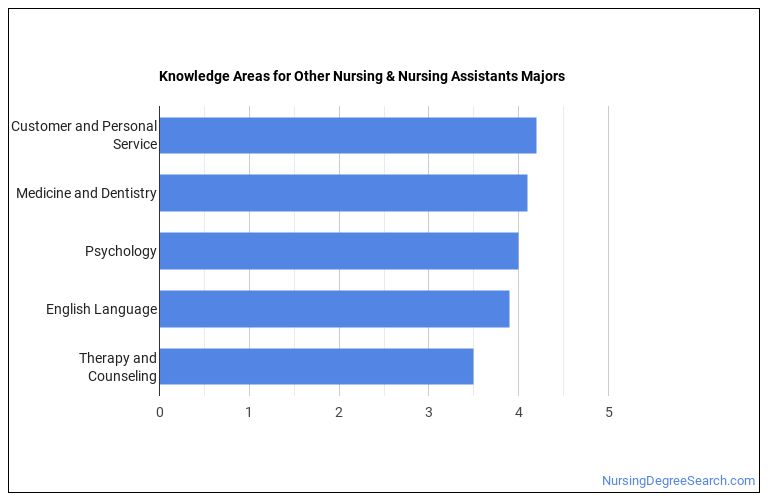
- Customer and Personal Service - Knowledge of principles and processes for providing customer and personal services. This includes customer needs assessment, meeting quality standards for services, and evaluation of customer satisfaction.
- Medicine and Dentistry - Knowledge of the information and techniques needed to diagnose and treat human injuries, diseases, and deformities. This includes symptoms, treatment alternatives, drug properties and interactions, and preventive health-care measures.
- Psychology - Knowledge of human behavior and performance; individual differences in ability, personality, and interests; learning and motivation; psychological research methods; and the assessment and treatment of behavioral and affective disorders.
- English Language - Knowledge of the structure and content of the English language including the meaning and spelling of words, rules of composition, and grammar.
- Therapy and Counseling - Knowledge of principles, methods, and procedures for diagnosis, treatment, and rehabilitation of physical and mental dysfunctions, and for career counseling and guidance.
Skills for Other Practical Nursing, Vocational Nursing and Nursing Assistants Majors
The following list of skills has been highlighted as some of the most essential for careers related to other practical nursing, vocational nursing and nursing assistants:
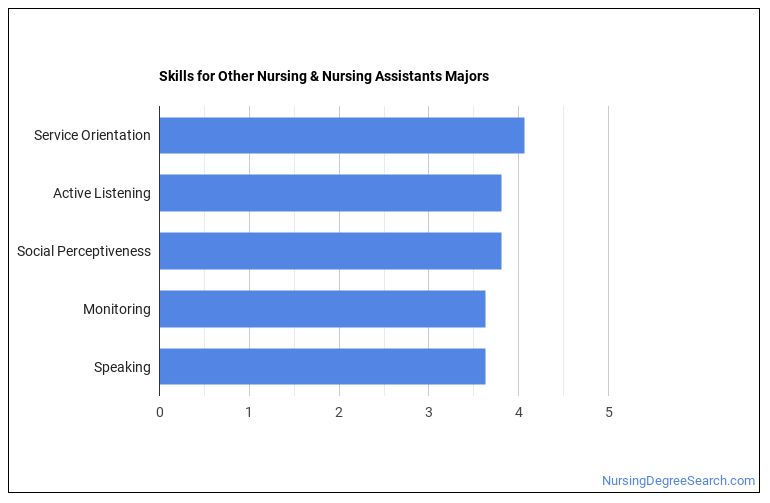
- Service Orientation - Actively looking for ways to help people.
- Active Listening - Giving full attention to what other people are saying, taking time to understand the points being made, asking questions as appropriate, and not interrupting at inappropriate times.
- Social Perceptiveness - Being aware of others’ reactions and understanding why they react as they do.
- Speaking - Talking to others to convey information effectively.
- Monitoring - Monitoring/Assessing performance of yourself, other individuals, or organizations to make improvements or take corrective action.
Abilities for Other Practical Nursing, Vocational Nursing and Nursing Assistants Majors
A major in other practical nursing, vocational nursing and nursing assistants will prepare for your careers in which the following abilities are important:
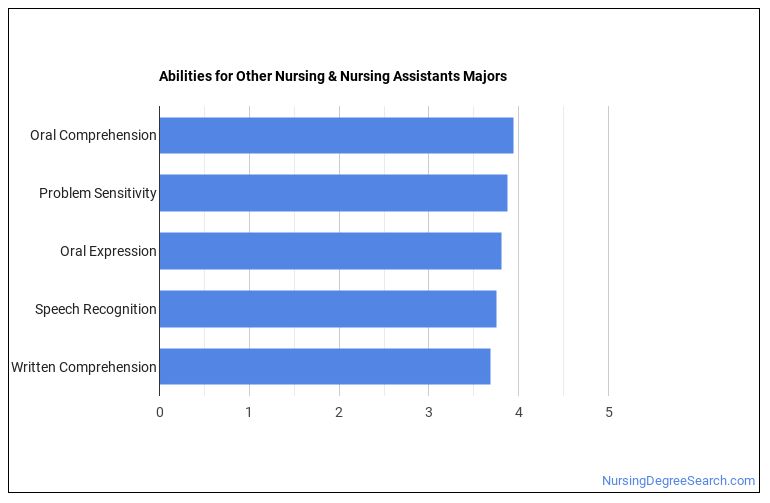
- Oral Comprehension - The ability to listen to and understand information and ideas presented through spoken words and sentences.
- Problem Sensitivity - The ability to tell when something is wrong or is likely to go wrong. It does not involve solving the problem, only recognizing there is a problem.
- Oral Expression - The ability to communicate information and ideas in speaking so others will understand.
- Speech Recognition - The ability to identify and understand the speech of another person.
- Written Comprehension - The ability to read and understand information and ideas presented in writing.
What Can You Do With a Other Practical Nursing, Vocational Nursing and Nursing Assistants Major?
Below is a list of occupations associated with other practical nursing, vocational nursing and nursing assistants:
| Job Title | Job Growth Rate | Median Salary |
|---|---|---|
| Licensed Practical and Licensed Vocational Nurses | 12.3% | $46,240 |
| Nursing Assistants | 11.5% | $28,540 |
Who Is Getting a Bachelor’s Degree in Other Practical Nursing, Vocational Nursing and Nursing Assistants?
Racial-Ethnic Diversity
At the countrywide level, the racial-ethnic distribution of other practical nursing, vocational nursing and nursing assistants majors is as follows:
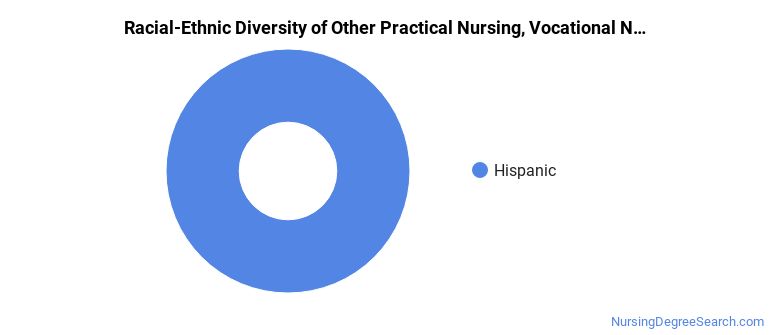
| Race/Ethnicity | Number of Grads |
|---|---|
| Asian | 0 |
| Black or African American | 0 |
| Hispanic or Latino | 15 |
| White | 0 |
| International Students | 0 |
| Other Races/Ethnicities | 0 |
Amount of Education Required for Careers Related to Other Practical Nursing, Vocational Nursing and Nursing Assistants
Some degrees associated with other practical nursing, vocational nursing and nursing assistants may require an advanced degree, while others may not even require a bachelor’s in the field. Whatever the case may be, pursuing more education usually means that more career options will be available to you.
How much schooling do you really need to compete in today’s job market? People currently working in careers related to other practical nursing, vocational nursing and nursing assistants have obtained the following education levels.
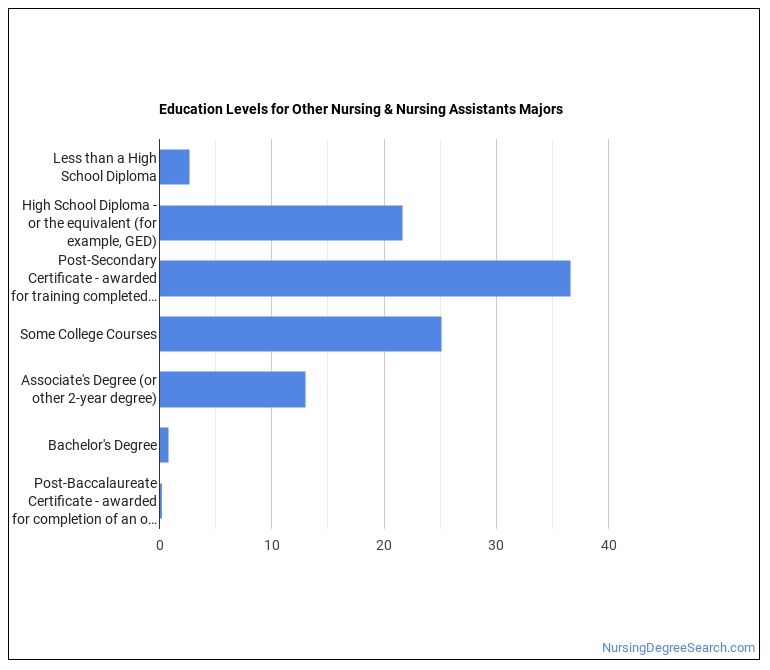
| Education Level | Percentage of Workers |
|---|---|
| Less than a High School Diploma | 2.7% |
| High School Diploma - or the equivalent (for example, GED) | 21.6% |
| Post-Secondary Certificate - awarded for training completed after high school (for example, in agriculture or natural resources, computer services, personal or culinary services, engineering technologies, healthcare, construction trades, mechanic and repair technologies, or precision production) | 36.6% |
| Some College Courses | 25.1% |
| Associate’s Degree (or other 2-year degree) | 13.0% |
| Bachelor’s Degree | 0.8% |
| Post-Baccalaureate Certificate - awarded for completion of an organized program of study; designed for people who have completed a Baccalaureate degree but do not meet the requirements of academic degrees carrying the title of Master. | 0.2% |
Online Other Practical Nursing, Vocational Nursing and Nursing Assistants Programs
The following table lists the number of programs by degree level, along with how many schools offered online courses in the field.
| Degree Level | Colleges Offering Programs | Colleges Offering Online Classes |
|---|---|---|
| Certificate (Less Than 1 Year) | 0 | 0 |
| Certificate (1-2 years) | 71 | 1 |
| Certificate (2-4 Years) | 9 | 0 |
| Associate’s Degree | 9 | 1 |
| Bachelor’s Degree | 1 | 0 |
| Post-Baccalaureate | 0 | 0 |
| Master’s Degree | 0 | 0 |
| Post-Master’s | 0 | 0 |
| Doctor’s Degree (Research) | 0 | 0 |
| Doctor’s Degree (Professional Practice) | 1 | 1 |
| Doctor’s Degree (Other) | 0 | 0 |
Explore Major by State
Alabama
California
District of Columbia
Idaho
Kansas
Maryland
Mississippi
Nevada
New York
Oklahoma
South Carolina
Utah
West Virginia
Alaska
Colorado
Florida
Illinois
Kentucky
Massachusetts
Missouri
New Hampshire
North Carolina
Oregon
South Dakota
Vermont
Wisconsin
Majors Related to Other Practical Nursing, Vocational Nursing and Nursing Assistants
You may also be interested in one of the following majors related to other practical nursing, vocational nursing and nursing assistants.
| Major | Number of Grads |
|---|---|
| Licensed Practical/Vocational Nurse Training | 45,886 |
| Nursing Assistant/Aide and Patient Care Assistant/Aide | 38,097 |
References
*The racial-ethnic minorities count is calculated by taking the total number of students and subtracting white students, international students, and students whose race/ethnicity was unknown. This number is then divided by the total number of students at the school to obtain the racial-ethnic minorities percentage.
- College Factual
- College Scorecard
- National Center for Education Statistics
- O*NET Online
- U.S. Bureau of Labor Statistics
- Usual Weekly Earnings of Wage and Salary Workers First Quarter 2020
More about our data sources and methodologies.
